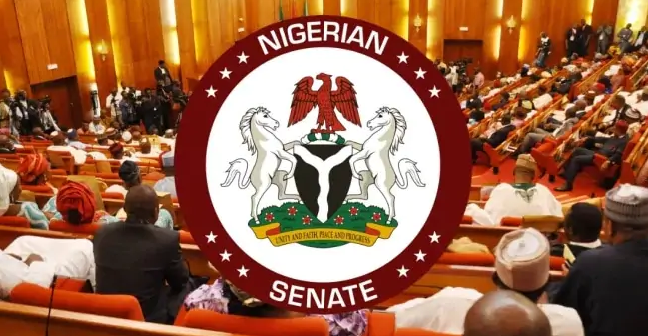The Senate on Wednesday directed its committees on National Planning, Non-Governmental Organizations (NGOs) and Diaspora to come up with a legal framework to regulate the inflow of aids into the country.
It equally lamented that 60 per cent of foreign aids are usually lost to transaction costs, wastage and capital flight back to the donor countries through the implementing contractors.
The resolution followed the adoption of the prayers of a motion entitled: “The need to make development aids more effective to work for Nigerians” sponsored by Senator Yahaya Oloriegbe.
The Senate also directed the National Planning Commission to develop a policy framework that would create mechanisms for development cooperation and aid effectiveness in Nigeria.
It also mandated all its relevant standing committees – that oversee Ministries, Departments and Agencies (MDAs) – who are beneficiaries of development aids/grants to request for, analyze and consider such aid/grants in the appropriation of funds for the MDAs’ activities.
The Senate further advised State Planning Commissions and Houses of Assembly to domesticate and implement federal policies and laws that would enable the states to achieve aids effectiveness.
In his contribution, President of the Senate, Senator Ahmad Lawan, thanked his colleagues for their incisive interventions and described the issue of aids as an important item that would be part of the legislative agenda of the 9th Senate.
Lawan said: “Let me say that this is one of those very important items to form our legislative agenda because aids to Nigeria particularly should not be treated like it is treated elsewhere in other countries that are less than Nigeria.
“We must be able to know exactly what the aids are coming for, and then streamline them with our national developmental objectives.
“So, the Chairman Diaspora and NGOs, you have the task of engaging the National Planning Commission together of course, with the Chairman of the Committee on National Planning to ensure that we know what the processes and procedures are and the regulations and guidelines.
“If we are not satisfied, then we have to come up with the legal framework that will ensure that if there is any aids to us as a country, our people benefit from the aids.”
In his lead debate, Senator Oloriegbe who represents Kwara Central Senatorial District, called on the Senate to be aware that Nigeria as a developing country receives aids from bilateral developed countries and multilateral organizations.
He said that aids provisions to Nigeria are majorly in the social sectors such as health, education and water.
He urged the Senate to note that Nigeria is not an aid dependent country “as the donor support to the country is about 5% of the National Budget.
However, in real monetary terms, this is a large amount.”
He reminded his colleagues that in the last few years, there had been increased humanitarian and emergency-related aids to Nigeria, “especially in the North East region.”
“The number of agencies active in the provision of assistance has grown substantially,” he said.
He said that on the global level, donor interest in coordination has also increased in recent years.
“The recent examples are the Paris Declaration on Aid Effectiveness (2005) and Accra High-Level Forum on Aid Effectiveness (2008) where partnership commitments with regard to harmonization, alignment, ownership, results and mutual accountability were further specified,” he said.
He said that the country should be worried that the National Planning Commission “is not effectively performing one of its stewardship role of ensuring alignment of donor assistance with national priorities, strategies and effective coordination of donor efforts in all sectors of (the) Nigerian economy.”
He noted that the absence of fundamental reforms to current management structures at the donor and country level, may lead to the risk of “continued inefficiencies, delivery failures, weak capacity of local institutions and ultimately, unnecessary delay in increasing employment, reduction in poverty, avoidable death and disease among the poor.”
He added that the Senate is disturbed that the actual benefits to the country from these aids is only about 40-45 per cent, with 55-60 per cent being lost to transaction costs, wastage and capital flight back to the donor countries through the implementing contractors.
He said that the non-consideration of aids/grants in budgets and appropriation do sometimes result in duplication, wastages and inefficiency in utilization of scarce resources.
He described as worrisome a situation where several attempts at donor coordination in the country had been ineffective “due to inadequate capacity in the public sector, divergent donor procedures and the absence of commonly accepted framework for this coordination.”
He further urged his colleagues to be alarmed that “detailed comparative data across states on donor agency staffing, location, business processes, and decision making is simply not available, which inevitably inhibits the depth of any discussion of ‘reforming the architecture’ or improving the efficiency of development assistance in Nigeria.”
He also said that there is an “urgent need to review the current situation with a view of establishing an overarching donor harmonization, implementation and monitoring framework to enhance aids effectiveness in Nigeria.”
Most Senators in their contributions supported the motion.
The four prayers of the motion were unanimously approved when put to voice vote by the President of the Senate, Senator Ahmad Lawan.




Discussion about this post